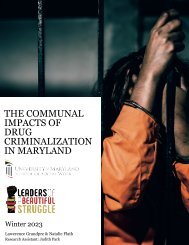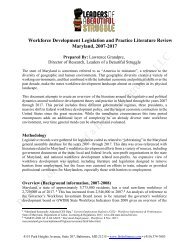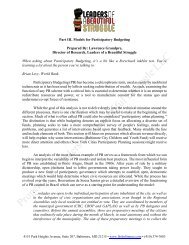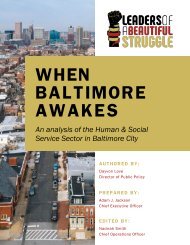Drug Decriminalization in Maryland Through an African Centered Research Paradigm- Analysis and Recommendations
This document offers guidance for theorizing questions related to a proposed research project purposed to advance drug decriminalization in Maryland.
This document offers guidance for theorizing questions related to a proposed research project purposed to advance drug decriminalization in Maryland.
- No tags were found...
You also want an ePaper? Increase the reach of your titles
YUMPU automatically turns print PDFs into web optimized ePapers that Google loves.
unlike the n<strong>in</strong>eteenth-century notion of scientific racism, drugs are not presumed to impact<br />
only those who are afflicted; a key element to grasp <strong>in</strong> order to appreciate the fear that<br />
underwrites drug prohibition is to underst<strong>an</strong>d that prohibitionists see a mimetic or<br />
contagious power with<strong>in</strong> drugs. The fear that drugs might consume the subject who<br />
themselves sought to consume the drug is not only a fear of the damage drugs might cause<br />
to that specific consumer but that this damage will spread amongst the other members of<br />
the community. The fear of these drugs is that they threaten the stability of the social order<br />
as a whole, function<strong>in</strong>g as what St<strong>an</strong>ley Cohen termed as the societal folk-devil, spread<strong>in</strong>g<br />
the addiction amongst the whole community. David Courtwright states that ‘absent the<br />
idea of addiction, the whole system of controll<strong>in</strong>g drug supply that has developed over the<br />
last two centuries would make little moral or practical sense.’ I would add to this that <strong>an</strong><br />
underst<strong>an</strong>d<strong>in</strong>g of the fear that drug addiction causes, <strong>an</strong>d import<strong>an</strong>tly spreads, the<br />
denigration of <strong>an</strong> idealized figure of the hum<strong>an</strong> is necessary to underst<strong>an</strong>d why the drug<br />
laws have persisted despite the devastation they have brought upon already oppressed<br />
peoples. Early drug prohibition campaigns <strong>in</strong> the US at the start of the twentieth century<br />
found much of their success through equat<strong>in</strong>g particular drugs with particular groups of<br />
racial others – opium with Ch<strong>in</strong>ese labourers, mariju<strong>an</strong>a with Mexic<strong>an</strong> migr<strong>an</strong>ts, etc. The<br />
US’s earliest recorded drug law, the 1875 City Ord<strong>in</strong><strong>an</strong>ce Aga<strong>in</strong>st Opium Dens passed <strong>in</strong><br />
S<strong>an</strong> Fr<strong>an</strong>cisco, was a law produced on ‘strictly ethnic grounds’, aimed aga<strong>in</strong>st ‘Ch<strong>in</strong>ese<br />
immigr<strong>an</strong>ts’ practice of smok<strong>in</strong>g opium’ <strong>an</strong>d fuelled by a popular media obsessed with<br />
‘images of “yellow fiends” debauch<strong>in</strong>g white women <strong>an</strong>d the youth of the nation’.<br />
Particularly relev<strong>an</strong>t is the way <strong>in</strong> which the threat of these drugs was seen as not merely<br />
conta<strong>in</strong>ed to the communities of the racial others, the real d<strong>an</strong>ger was how they could spill<br />
out <strong>in</strong>to White communities. In short, drugs as ‘tr<strong>an</strong>sgressive subst<strong>an</strong>ces’ are read as<br />
hav<strong>in</strong>g the power to tr<strong>an</strong>sform even the most rational, autonomous, enlightened <strong>an</strong>d<br />
sovereign Europe<strong>an</strong> ‘m<strong>an</strong>’ <strong>in</strong>to the lazy, violent, depraved figure of the sub-hum<strong>an</strong>. The<br />
correlative response to this fear is the aim of expell<strong>in</strong>g these ‘drugs’ from the collective<br />
social order, along with those who might be addicted or particularly susceptible to <strong>an</strong><br />
addiction to these subst<strong>an</strong>ces. The metaphysical quality read <strong>in</strong>to drugs is easily<br />
tr<strong>an</strong>sferred <strong>in</strong>to the very material bodies of those already traditionally constructed as be<strong>in</strong>g<br />
a threat to the boundaries of hum<strong>an</strong>ity: racially othered populations.<br />
Sociologist <strong>an</strong>d cultural theorist Je<strong>an</strong> Baudrillard adds a further element to this argument<br />
with his own read<strong>in</strong>g of how <strong>in</strong>debted the fear of ‘drugs’ is to a Weberi<strong>an</strong> conception of<br />
the economic <strong>an</strong>d social good <strong>in</strong> western society. For Baudrillard, the West arrogates onto<br />
itself a specific capacity for delayed gratification <strong>an</strong>d it is this capacity taken to underlie<br />
presumptions of civilization. The condemnation of drugs therefore functions as a st<strong>an</strong>d-<strong>in</strong><br />
for the fear of the threat of the loss of that capacity for delayed gratification, the defeat of<br />
reason <strong>an</strong>d the will, at the h<strong>an</strong>d of the appetite <strong>in</strong> Aristoteli<strong>an</strong> terms. Baudrillard argues<br />
that ‘traces of this long-st<strong>an</strong>d<strong>in</strong>g condemnation l<strong>in</strong>ger on <strong>in</strong> our own vision of modern<br />
drugs <strong>an</strong>d of the occult power they derive from their <strong>an</strong>cient symbolic virtues.’ As opposed<br />
to the ‘evil’ of drug addiction resid<strong>in</strong>g <strong>in</strong> the drug itself <strong>an</strong>d <strong>in</strong>fect<strong>in</strong>g western modernity<br />
4151 Park Heights Avenue, Suite 207, Baltimore, MD 21215 • www.lbsbaltimore.com • (410) 374-7683









